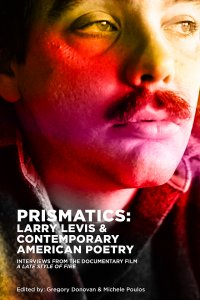excerpt from the Introduction to
Prismatics: Larry Levis & Contemporary American Poetry
“All this was a mission.”
—Rainer Maria Rilke, Duino Elegies
Irony can be cheap—one of several reasons why it’s so common, in all senses of the word, in contemporary life and art. In unpracticed hands, irony affords a cool withdrawal with a shrug at the very moment when inconvenient truths emerge or strong emotions erupt that would otherwise force us to stand up in them. At the same time, ironies can metaphorically function like the wet tongs a blacksmith will use to hold a glowing mass of red-hot metal at a safe distance—as I’m doing in the title of this essay. Yet irony too often is used by inept writers as a way to avoid saying outright what they may actually think or believe—especially when they don’t fully know what that might be—so they might then safely and evasively “leave it up to the reader.” Irony is always an imperfect escape, and at times we may use it precisely to call attention to that imperfection, offering it as a backhanded admission that this is something we cannot easily bear. Plath uses irony in that ironic way in her often-misunderstood poem “Daddy,” where the irony is so extreme and acidic, so cartoonish and childish, that it becomes self-accusation and self-mockery. Irony may proceed from, but isn’t the same as, confusion or embarrassment or amazement or awe. It may be indigenous to jokes, but really, it’s not the equal of humor. When a friend dies, we may be conscious of any number of sweet absurdities or ugly truths, and might find ourselves painfully stumbling over the ridiculous, but it’s no longer time for flip recitals of irony, which can only unveil our commonplace cowardice in the face of death. Fully contemplated death, like birth, is grand—inescapably powerful, absolute, profound. It cannot be questioned or appealed, cannot be tricked or reversed. And so, ordinarily, there isn’t much room for irony in the elegiac.
When your friend dies, and the friend is a poet, and a great poet at that, there isn’t a proper place for irony in the natural urge toward elegy. Of course, we might sometimes observe that the community of poets may take up their flourishing pens all too readily and publish all too quickly their poems of elegy. It can feel as if the impulse has been tainted by ambition or greed or callousness: “My great friend died, but at least I got a poem out of it.” This dark suspicion, ripe material for the practice of irony, is balanced by the simple fact that whenever a poet faces trouble and hurt, what else can be done but to make a poem in response? Or is keeping silent for some time the only appropriate tribute free of sentimentality or venality? I think it may be, but if so, for how long should that silence reign? We find ourselves snagged by the horns of dilemma.
The man could write like fire. That is the first and foremost, and the final, word. That is what he was doing in the spring of 1996—he was deep in the throes of it, lost in his work. He was on a temporary leave he’d taken to finish up a collection of poetry—and in fact, that is precisely what I am doing myself at this moment that I write. That isn’t irony—it’s connection. Larry Levis was my friend and my colleague, and one day in early May of that year an unexpected turn of events at his home on Church Hill in Richmond, Virginia dictated that I would be given a mission.
That mission rippled outward in unexpected ways—on from the immediate aftermath of Larry’s death and on into the unpredictable years that followed.
Gregory Donovan, co-editor of Prismatics: Larry Levis & Contemporary American Poetry, producer of the documentary film Larry Levis, American Poet, directed by Michele Poulos, author most recently of Torn from the Sun (Red Hen Press, 2015), Senior Editor of Blackbird: an online journal of literature and the arts, and creative writing faculty member at Virginia Commonwealth University.
Prismatics: Larry Levis & Contemporary American Poetry is a collection of the full-length transcriptions of the extended interviews Gregory Donovan and Michele Poulos conducted with a group of America’s most notable poets—including two U.S. Poet Laureates—in making the documentary film A Late Style of Fire: Larry Levis, American Poet. These discussions cover not only their relationships with Levis and his poetry, but also more wide-ranging commentaries on a broad spectrum of American literary life.
Prismatics reflects the multiple angles of perception provided by its fourteen participating poets, including David St. John (who also contributed the foreword), Philip Levine, Charles Wright, Norman Dubie, Gerald Stern, Carolyn Forché, Stanley Plumly, Colleen McElroy, David Wojahn, Carol Muske-Dukes, Kathleen Graber, Peter Everwine, Charles Hanzlicek, and Gail Wronsky. The book’s title points out that Levis’s personal and professional life as a writer provides a prism which leads these discussions to range broadly into a wider portrait of a highly influential era of poets and poetics, personified not only in Levis, but in each of the poets interviewed. In these lively, spontaneous conversations, Prismatics provides an informed and intimate portrait of the risks and triumphs of a life in poetry, a discussion of distinct intellectual, practical, and historical value that’s also emotionally involving—and quite entertaining.
![]()

